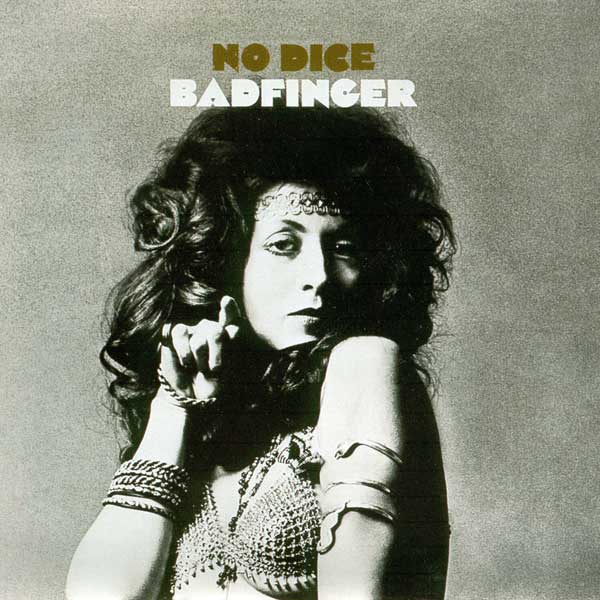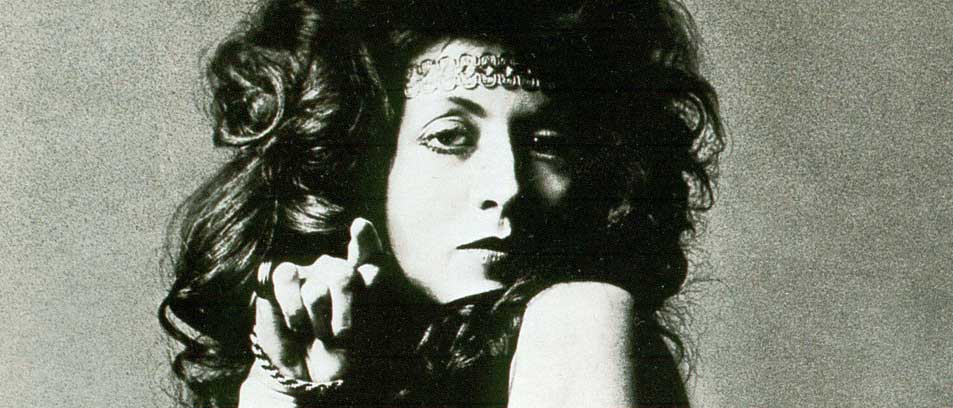
I Can't Take It
I Don't Mind
Love Me Do
Midnight Caller
No Matter What
Without You
Blodwyn
Better Days
It Had to Be
Watford John
Believe Me
We're for the Dark
Formed by a couple of rough house types – Swansea’s Pete Ham and scouser Tom Evans – Badfinger (a discarded title for With A Little Help From My Friends) signed to The Beatles’ Apple records and released No Dice – either their second or third album, depending on how you count – in 1970.
The band entered the studio with Beatles' engineer Geoff Emerick to record No Dice, but Apple didn’t hear a hit on the record. Ironically, No Matter What, one of the two Mal Evans-produced tracks added to the album ‘for balance’, turned out to be the single, which made US No.8/UK No.5 in early 1971.
Raw by later standards, No Dice all their best songs. Without You was later covered by Harry Nilsson and, um... Mariah Carey, and No Matter What still gets radio play. No Dice reached the US Top 30, with Rolling Stone rating it ‘one of the best albums of the year’, but the failure of No Dice to make waves in Britain underlined Badfinger’s ‘pop singles band’ tag in an era when albums were the new, credible rock currency.
Things weren't helped by Apple. Legendary press officer Derek Taylor left and, with The Beatles suing each other from behind different managers, the organisation hit the rocks. As Pete Ham revealed to New Musical Express in a 1971 interview: “There wasn’t much promotion done… there suddenly wasn’t anyone at Apple to work on it."

Every week, Album of the Week Club listens to and discusses the album in question, votes on how good it is, and publishes our findings, with the aim of giving people reliable reviews and the wider rock community the chance to contribute.

Other albums released in November 1970
- American Beauty - Grateful Dead
- Bryter Layter - Nick Drake
- The Man Who Sold The World - David Bowie
- Layla and Other Assorted Love Songs - Derek And The Dominoes
- Barrett - Syd Barrett
- Loaded - The Velvet Underground
- The J. Geils Band - The J. Geils Band
- Naturally - Three Dog Night
- Despite It All - Brinsley Schwarz
- Emerson Lake & Palmer - Emerson, Lake & Palmer
- Stephen Stills - Stephen Stills
- Tea for the Tillerman - Cat Stevens
- All Things Must Pass - George Harrison
- Gentle Giant - Gentle Giant
- Lola Versus Powerman and the Moneygoround, Part One - The Kinks
- Twelve Dreams of Dr. Sardonicus - Spirit
- Play It Loud - Slade
- Air Conditioning - Curved Air
- Blows Against the Empire - Paul Kantner & Jefferson Starship
- Cruel Sister - Pentangle
- Loaded - The Velvet Underground
- Medusa - Trapeze
- Number 5 - Steve Miller Band
- Starsailor - Tim Buckley
- Steppenwolf 7 - Steppenwolf
- Warhorse - Warhorse

What they said...
"I don't think these guys imitate the Beatles just so Paul will give them more hits – they've got hits of their own. But from the guitar parts (play Better Days right after I Feel Fine) and harmonies (the Paul of I've Just Seen a Face atop the Paul of Long Tall Sally) to concept and lineup, an imitation is what this is, modernized slightly via some relaxed countrification. They write almost well enough to get away with it, too." (Robert Christgau)
"Without doubt, Badfinger's most noticeable trademark is Pete Ham's ability to write, sing, and even look uncannily like Paul McCartney. And it even goes beyond that, for the group's similarities to the Beatles, in their late Beatles studio-type sound and the good group singing that the late Beatles so direly lacked, are really boggling. It's as if John, Paul, George, and Ringo had been reincarnated as Joey, Pete, Tom, and Mike of Badfinger." (Rolling Stone)
"Badfinger carries on the rhythm-happy tradition of the early Beatles, rocking to the big beat without hang-ups or pretensions of profundity. Pete Ham and Joey Molland write most of the group's original material, but songs, as well as the Liverpool-type voices, cover the Beatles like a Xerox. The catch is they're good, and prove it nicely on No Matter What, Better Days, Without You and I Can't Take It. (Billboard)

What you said...
Gary Claydon: The story of Badfinger is a troubled, at times brilliant, always fascinating but ultimately tragic one. Purely from an artistic point of view, Badfinger were responsible for a number of truly global hits and their work enjoyed a 21st Century resurgence after Baby Blue was used in the closing sequences of Breaking Bad. Dan Mantovina wrote an excellent book about them a while back. I think it's long out of print but might be available digitally. I'd highly recommend it to anyone, whether or not you are a fan of the band.
That story, however, is one which needs its own time and space, so what about the album in question?
Badfinger were purveyors of prime- power pop. The first non-Beatles act signed to Apple records, they were, in some quarters, viewed as natural successors to The Fab Four. No Dice was the band's second album under the name Badfinger (their debut was released while they were still The Iveys) and was the first with Joey Molland on board, having replaced Ron Griffiths. Along with Pete Ham, Tom Evans & Mike Gibbins, Molland was part of the 'classic' Badfinger line-up. Although on No Dice, like much of their work, Ham exerts the most influence, especially as principle songwriter, the contributions of Evans and Molland in that department cannot be overestimated.
It's difficult to avoid the influence of The Beatles when listening to Badfinger but it doesn't take much scratching at the surface to uncover a fine band in their own right.
The two best known songs on No Dice are pretty much polar opposites of each other. No Matter What is up-beat power pop and was a top 10 hit single on both sides of the Atlantic while the plaintive ballad Without You needs little introduction. Surely one of the most covered pop songs of all time, it's a magnificent example of the Ham/Evans writing collaboration. While the Badfinger version is, understandably, overshadowed by the smash-hit Nilsson cover, it still manages to hold it's own.
Some of the lesser known tracks are almost as interesting though. In particular the folky Blodwyn with it's country-fied guitar, the boogie piano and jam of Watford John (a title apparently inspired by a studio engineer and not the erstwhile Watford FC chairman, Elton!) and especially the Ham-penned closer We're For The Dark, which consists of double-tracked Ham vocals & simple acoustic guitar backed by a nicely understated bass pulse and strings, with no drums involved. It really is a hidden gem of a track.
As an aside, the album cover was a gatefold sleeve with the front being the model's torso & the back being her lower half.
Over time, the follow-up album Straight Up seems to have become regarded as Badfinger's best but as good as that is, I prefer No Dice which has a slightly more 'raw' feel to it. Not perfect by any means but a fine showcase for this talented band.
Chris Webb: Oh man, one of my favourite 70s bands, and a great, great album. I prefer Wish You Were Here by Badfinger, but this is a classic, too.
Chris Elliott: It's another okay album, of its time, not groundbreaking. There's nothing to make you think, "I'll listen to that again" in 2022.
Dale Munday: I can't listen to this band without comparing them to the Rutles or Oasis.
Mike Canoe: All I knew about Badfinger before this week was the Beatles connection, which ultimately became the proverbial albatross around their collective necks, and the badness and sadness that ensued. That, and Def Leppard did a ripping cover of No Matter What on their deeper than the average tribute album, Yeah.
After listening to No Dice this week, I have a better understanding of how deep the Beatles influence was, not just on their music but on the business side of things as well. I Can't Take It, Midnight Caller, Watford John, and Love Me Do (a pretty obvious wink!) are dead ringers for latter-day Beatles - and apparently had the Beatles' – or at least, Apple Records – blessing to be. Blodwyn, with its folksy charm, is my current favourite.
As others have suggested, it's enjoyable, if not groundbreaking. Unfortunately, their legacy seems to be more as casualties of the music biz grinder than the music they left behind.
Alex Hayes: Even by the occasionally sordid standards of the music industry, you'd be hard pressed to find a band as badly screwed over and desperately unlucky as Badfinger were. The group's rotten history, not to mention their ties to The Beatles, have, between them, managed to eclipse both their musical output and their achievements. No Dice is solid testimony as to just how unfortunate that really is.
With one exception, it's actually an intelligently composed and enjoyable collection of songs. More power-pop than outright rock, No Dice's 12 tracks tend to sweep the listener along on a pleasant little journey, as opposed to pummelling them into submission. Don't expect anything like Speed King on this album. We're into more sedate, radio-friendly, and, yes, Beatles-esque territory here. For someone like myself, a big and unabashed fan of the Fab Four, that really ain't such a bad thing, even if the mimicry does come across as a little on-the-nose at times. We're even presented with a track here titled Love Me Do. Give me strength.
There are two other songs particularly worthy of a mention here, for contrasting reasons. The first of these is No Matter What, a track which later ended up being excellently covered by the post-millennium Def Leppard. Both versions still have their merits, and remain worthy of attention. Unfortunately, the second song from No Dice that I feel almost obligated to single out for attention, is far more infamous than noteworthy in my eyes, as it's the execrable Without You. Oh God, here we go. It's Hallelujah all over again.
A few months ago, we covered Jeff Buckley's Grace album. Doing so kind of forced me into reacquainting myself with Buckley's version of Leonard Cohen's Hallelujah, an overwrought and sickly number that I would happily never have to sit through ever again. It's a similar scenario this week with Without You. However, I must point out (and, again, similar to Hallelujah), that it's what the song later came to represent that I find so difficult to stomach, more than anything else.
If you can endure the overly sentimental, four-and-three-quarter minutes of goop that make up Without You though, the rest of No Dice is actually quite a treat. It presents Badfinger as a better than average power-pop/soft rock act. One who deserve to be remembered for more than just bad business dealings, tragedy and endless Beatles comparisons. It's not a classic by any stretch, but engaging enough.

Final score: 6.61 (36 votes cast, total score 238)
Join the Album Of The Week Club on Facebook to join in. The history of rock, one album at a time.

